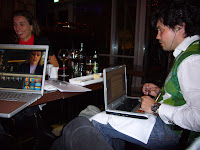
Entrepreneurs have always been strange, fascinating, passionate and often stubborn beyond the comprehension of normal nine-to-fivers. If you add "Internet" to the mix, you get an even stranger breed, the “internet entrepreneur”.
For a long time, our society had a certain view of what it meant to be an entrepreneur. Then in the mid nineties the globe exploded with visionaries waving increasingly more outlandish plans to build global auction companies online, or sell all the books in the world to all the people in the world or to be able to search and find any information anywhere anytime.
The venture capital community were doing back-flips of joy at such unmatched returns, and stock exchanges all over the world saw record highs. It really seemed there was a new economy arising. An economy in which normal rules did not apply, where kids with brains and guts could leapfrog established giants, an era where technology and innovation seemed to have no boundaries.
We all know what happened in 2000. The infatuation with our industry turned to scorn when bankruptcy lawyers came to pick up the pieces. This wave of disappointment hit Internet entrepreneurs in Europe harder than their colleagues in the US, a country where bouncing back from defeat is part of an accepted success story. In Europe the gloating voices of the media and the "I-always-knew-it-would-turn-out-to-be-a-bubble" attitude of traditional companies created a climate where Internet entrepreneurs were no longer the flavour of the month.
But in the meantime something happened. It happened in the digital mines of Silicon Valhalla in Scandinavia, and in the sharpest minds in the gaming and gambling hub Gibraltar, and in the awakening German web 2.0 scene. It happened in the Mecca of mobile phones Finland, in the incubators in Israel and in France where the blog movement grew stronger for every blog post, every comment, every user generated opinion. A new breed of European companies and entrepreneurs started to surface and the companies they build were no longer built on empty dreams or US blueprints. Even though many of the heroes of the Dotcom boom are back with new even bolder ideas.
The new internet entrepreneurs have innovative, often disruptive ideas. Ideas not focusing on hype and fast cash, but with a focus on real new services. Their focus is on making the user a little bit happier. "Always delight the user", as Skype’s motto suggests. Many of the new stars are American, but a growing number are from Europe, and almost all of them are global.
And while these entrepreneurs were building their companies a new European eco system started to evolve. An eco system I believe will be one of the most important corner stones in Europe’s digital future. Companies like Skype, Spanish WiFi company FON, German Sevenload, Finnish Habbo Hotel or Swedish free mobile service Rebtel are beating the incumbents as well as the Americans at their own game. When serial-entrepreneurs like the Sahmwer brothers in Germany, the French blog overlord Loïc LeMeur, Skype founder Niklas Zenström and many other successful European digital entrepreneurs exchange ideas something happens. The same thing that made Silicon Valley so vibrant. We are experiencing an entrepreneurial zeitgeist giving birth to companies like French Netvibes - who in no time gathered millions of Europeans and makes large portals tremble.
In a not too distant future most of us will be knowledge workers, many of us even digital workers. Some of us may well be occupied with such alien tasks as producing digital furniture to sell in online worlds, or pursuing athletic careers in the booming digital sports arena. Others may simply be doing their work on different hours, from different locations. In any case, something significant IS happening.
We are seeing a new Europe evolving, a Europe focusing on Europe, European entrepreneurs easily maneuvering through the diverse cultural landscape of Europe while striking alliances and flirting with the growing Asian titans India and China. For them the question "how can we Europeans compete with the US" is as strange as the opposite for an American entrepreneur. This new breed of European entrepreneurs will create jobs, wealth, inspire and make life easier, more fun and/or a lot of other things with their ideas.
Something even more exiting is happening; the term entrepreneur is no longer high-jacked by the stereotype idea of the whizkid sitting in his garage with a mad plan. Employees on all levels in already existing organisations are starting to look at themselves as entrepreneurs or intrapreneurs with the right and maybe even the obligation to build, innovate, change and create.
Being an Internet entrepreneur is not necessarily about owning the company. You could just as well be an employee. It is about being passionate about digital opportunities and taking advantage of living in the most exciting of all times to create.
Because we are living in an economy where normal rules where offset, where kids with brains and guts could frog leap established giants, an era where technology and innovation seemed to have no boundaries. Or aren’t we?
(Orginally written for
Picnic Holland. See you at the event later this week!)

 Photo by Jacob Bøtter.
Photo by Jacob Bøtter. Photo by Jacob Bøtter.
Photo by Jacob Bøtter.




















 Our favorite ex-scientist of Amazon, Andreas Weigend (SIME speaker 2006 and 2007), will be at the
Our favorite ex-scientist of Amazon, Andreas Weigend (SIME speaker 2006 and 2007), will be at the 

